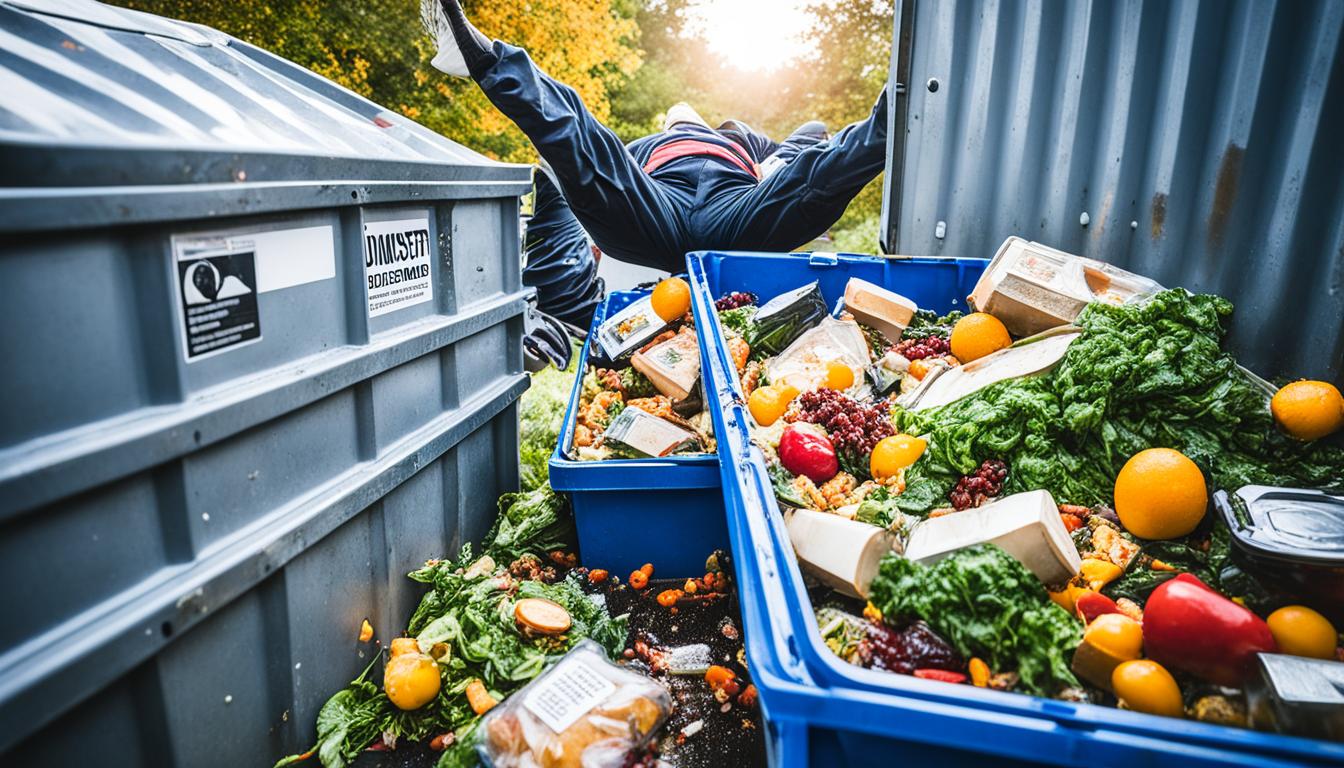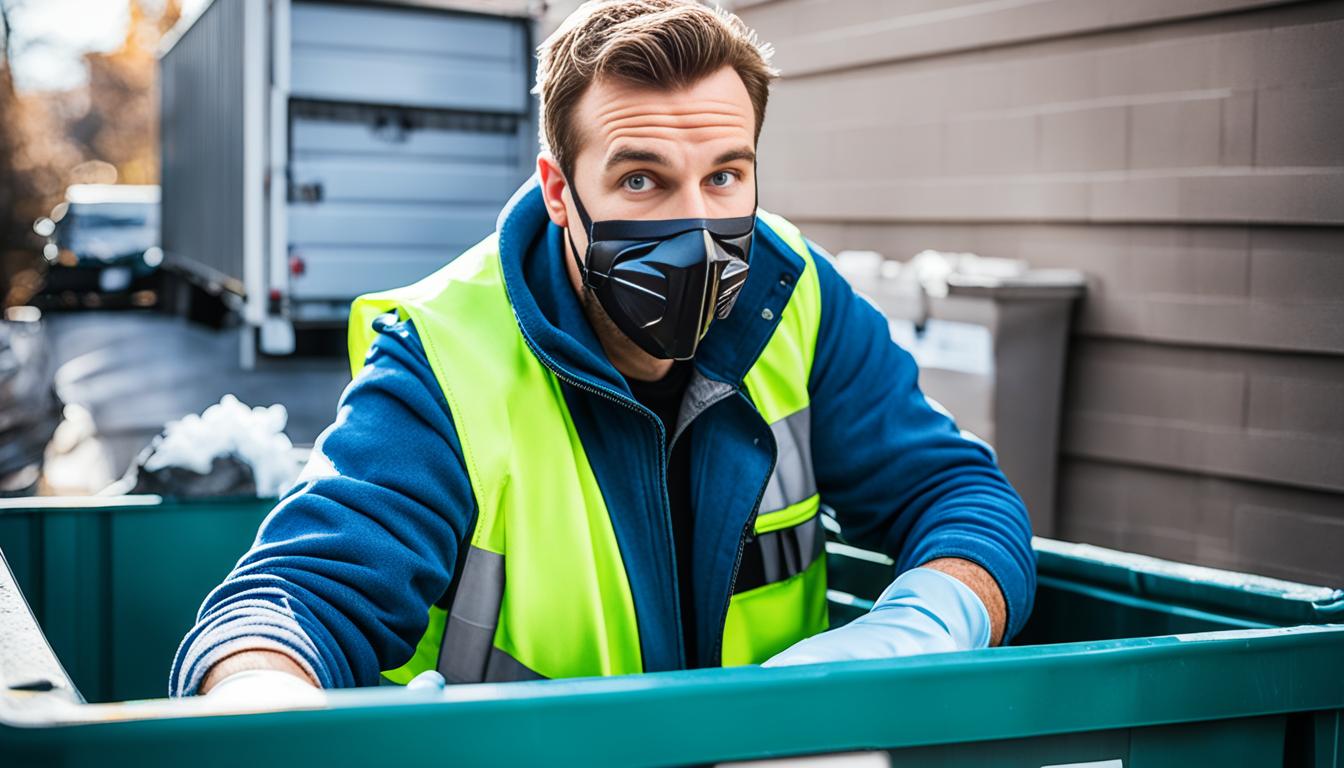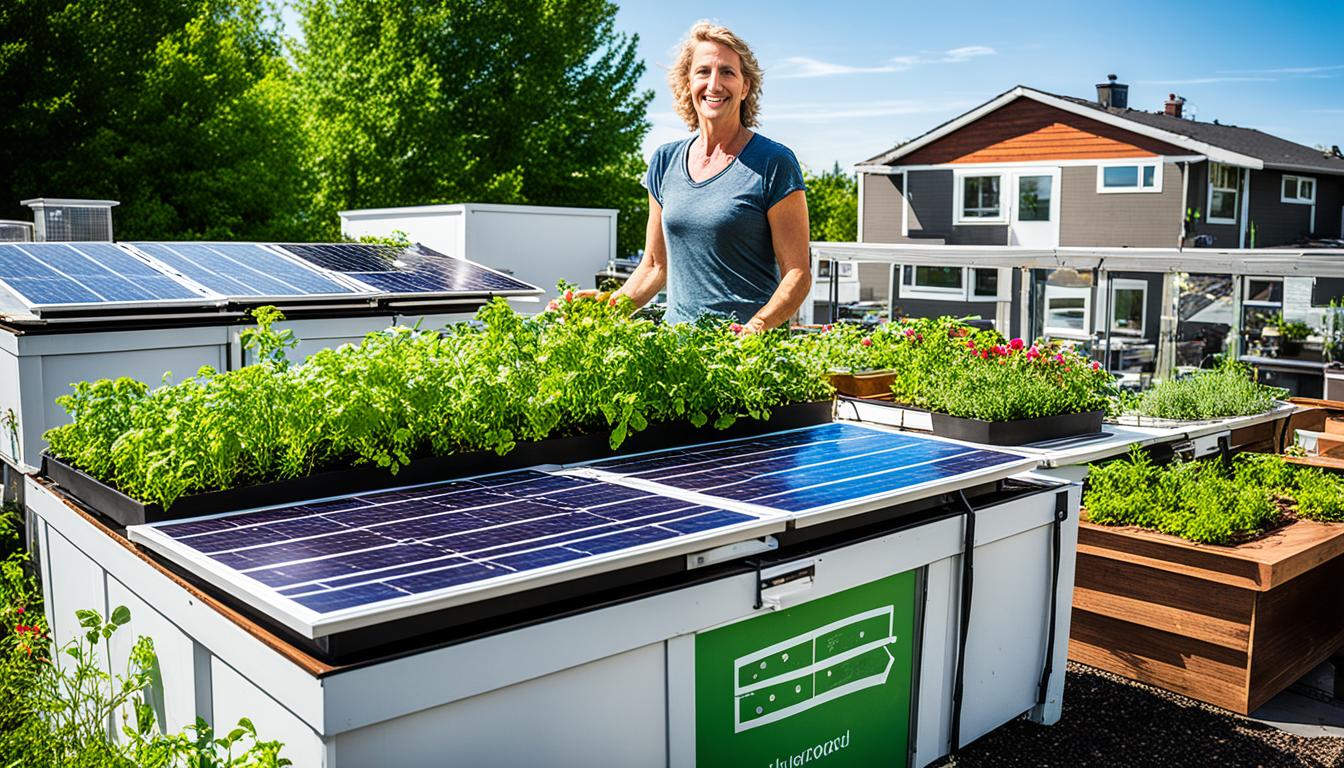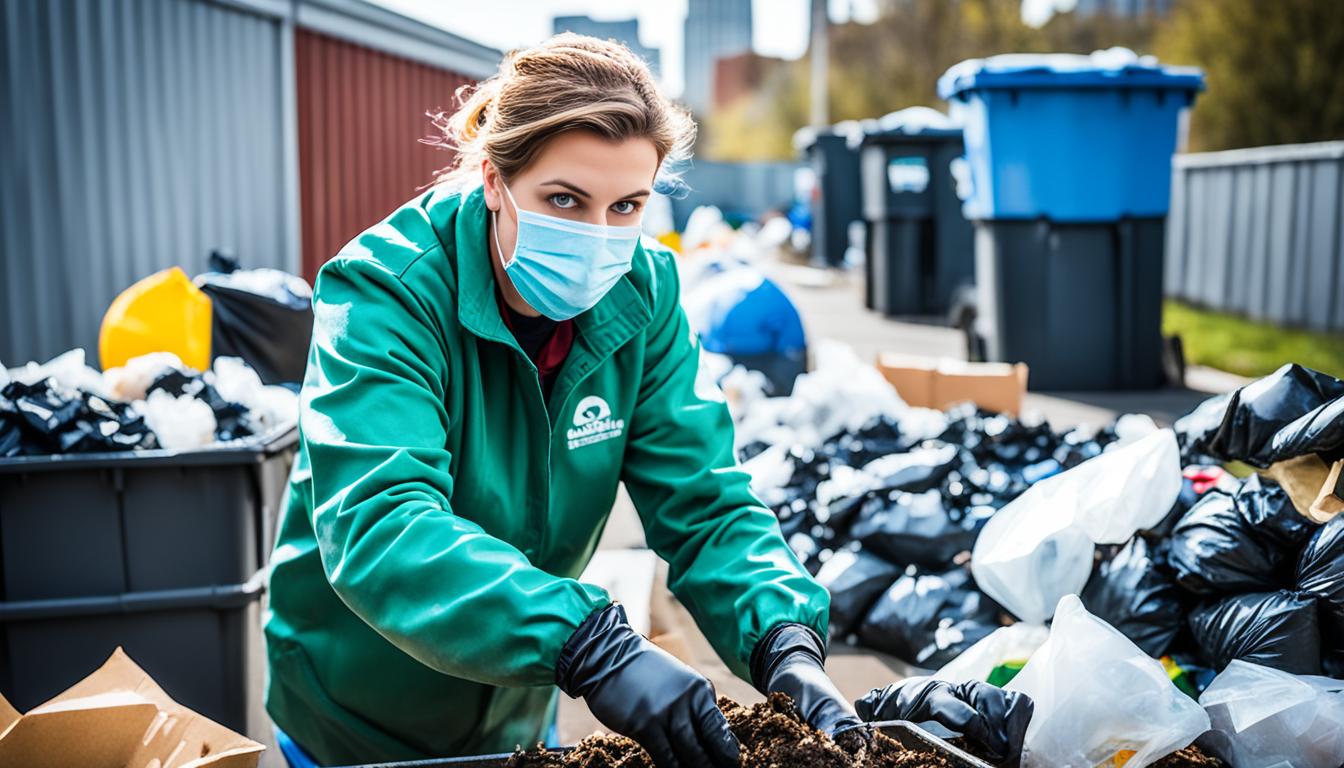Disclosure: This Post Contains Affiliate Links; We earn a commission on purchases.
When it comes to the pressing issue of food waste, dumpster diving has emerged as an unconventional yet impactful solution. This practice of rescuing edible food from dumpster bins plays a significant role in minimizing food waste and promoting sustainable food practices. By preventing food waste and reducing the amount of food that ends up in landfills, dumpster diving contributes to a more eco-friendly and efficient food system.
It is estimated that around 40 percent of all food in the United States is discarded and ends up in dumpsters. This alarming statistic highlights the urgency of finding innovative ways to address food waste. Dumpster diving not only helps tackle this issue head-on but also addresses food insecurity. With approximately 1 in 7 Americans being food insecure, the practice of dumpster diving can provide much-needed nourishment and sustenance to those in need.
Often referred to as “freegans,” individuals who engage in dumpster diving view it as a form of resistance against our wasteful consumer culture. They shine a light on the absurdity of a food system that allows perfectly edible food to go to waste. By raising awareness and utilizing their platforms, freegans inspire others to take action and reconsider their own consumption habits.
Key Takeaways:
- Dumpster diving is an effective way to minimize food waste and prevent edible food from ending up in landfills.
- Approximately 40 percent of all food in the United States is discarded and contributes to food waste.
- Dumpster diving can address the issue of food insecurity by providing nourishment to those in need.
- Freegans engage in dumpster diving as a form of resistance against our wasteful consumer culture.
- By raising awareness and promoting sustainable practices, dumpster diving inspires individuals to take action and reduce food waste.
The Environmental Impact of Food Waste
Food waste has a significant environmental impact. In the United States, food production alone requires 10 percent of our energy budget and is responsible for 75 percent of global deforestation. Additionally, food production uses 80 percent of our freshwater supply.
“Food production alone requires 10 percent of our energy budget and is responsible for 75 percent of global deforestation.”
When this food ends up in dumpsters and landfills, it produces methane, a potent greenhouse gas that contributes to climate change. Uneaten food is the largest component of solid waste in municipal streams.
By diverting food from landfills through dumpster diving, individuals can help reduce the environmental impact of food waste.
Take a look at the data below to understand the scale of the environmental impact caused by food waste:
| Environmental Impact | Statistics |
|---|---|
| Food production energy budget | 10% of total energy budget in the United States |
| Deforestation | Responsible for 75% of global deforestation |
| Freshwater supply | 80% of freshwater supply used in food production |
| Methane production | Food waste in landfills produces methane, a potent greenhouse gas |
The Rise of Dumpster Diving Culture
Dumpster diving has become increasingly popular, with individuals sharing their dumpster diving hauls and experiences on social media. People who participate in this practice, often referred to as “freegans,” see dumpster diving as a way to defy our wasteful consumer culture. For them, it is a form of activism and protest against a flawed food system.
Online dumpster diving communities have emerged, where individuals exchange tips, advice, and excitement about their latest dumpster diving finds. These communities serve as platforms for like-minded individuals to come together and share their passion for rescuing edible items from dumpsters. They celebrate the abundance of perfectly good food that would have otherwise gone to waste.
Some dumpster divers have even gained a following on social media, showcasing their impressive hauls of perfectly edible food. Their posts not only highlight the extent of food waste but also inspire others to reconsider their own consumption habits. By sharing their finds, they aim to raise awareness and encourage others to take part in reducing food waste.
Dumpster Diving Tips and Tricks
- Choose your diving spots wisely: Not all dumpsters yield great finds. Look for locations near grocery stores, restaurants, and bakeries, as they often discard perfectly good food.
- Time it right: Understanding the dumping schedule of your chosen stores can help increase your chances of finding fresh and edible items.
- Come prepared: Equip yourself with gloves, appropriate clothing, a flashlight, and sturdy boxes or bags to transport your finds safely.
- Exercise caution: Dumpster diving can sometimes involve legal and safety risks. Always be mindful of your surroundings, avoid trespassing, and prioritize your safety.
- Stay sanitary: Thoroughly wash any fresh produce before consuming it and use your judgment to determine the edibility of other items.
“Dumpster diving has not only changed the way I approach food but also my perspective on waste and consumerism. It’s incredibly rewarding to find perfectly good food and know that I am contributing to reducing food waste.” – Sarah, a dedicated dumpster diver
Impressive Dumpster Diving Hauls
Take a look at some of the incredible dumpster diving finds that have been shared on social media:
| Image | Description |
|---|---|
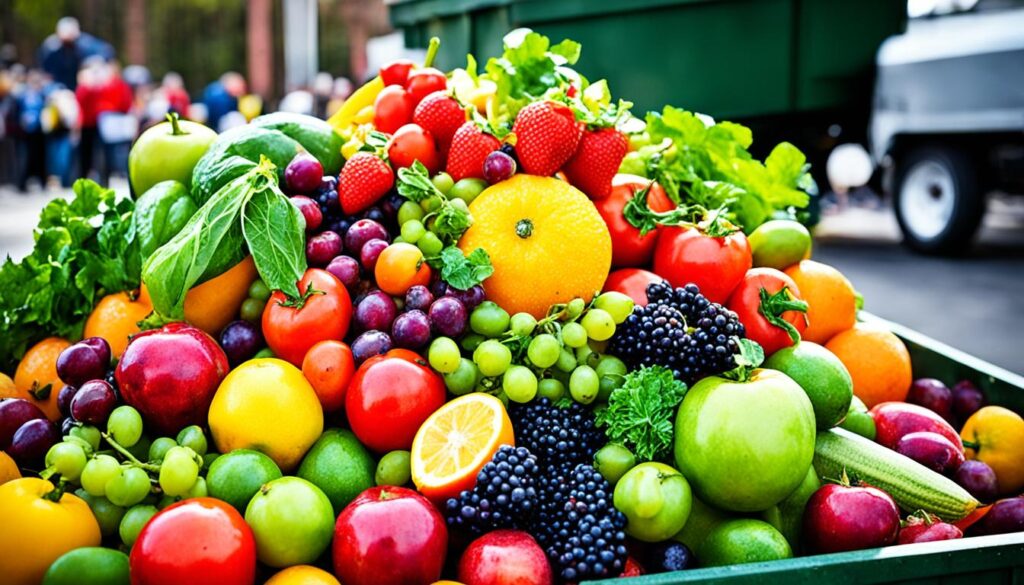 | A variety of fresh produce, including fruits and vegetables, perfectly packaged and ready to be enjoyed. |
 | Boxes of unopened packaged foods, such as crackers, pasta, and canned goods, still well within their expiration dates. |
 | Crates of bakery items, including bread, pastries, and cakes, untouched and ready to be savored. |
The impressive dumpster diving hauls showcased on social media not only highlight the abundance of perfectly good food that gets discarded but also inspire others to consider dumpster diving as a way to reduce food waste.
The Practice of Dumpster Diving
Dumpster diving requires some preparation and knowledge. Finding a suitable dumpster is essential, and it may take some time to find the right location. Timing is also important, as divers need to understand the dumping schedule of their chosen store. Finding a Dumpster: Look for areas with high concentrations of retail stores, such as shopping centers or grocery strips. These locations are more likely to have dumpsters filled with edible food.
Once you have identified potential spots, it’s time to visit during off-peak hours, usually late evenings or early mornings, to avoid interference and maximize your chances of finding quality items. You can also check local social media groups or online forums dedicated to dumpster diving for recommendations on specific locations.
Dumpster diving gear is essential to ensure your safety and ease of retrieval. Remember to bring:
- Gloves: Protect your hands from sharp objects, broken glass, or unsanitary conditions.
- Appropriate Clothing: Wear comfortable clothing that covers your body to protect against dirt and potential hazards.
- Flashlight: Enhance visibility in low-light conditions to inspect the quality and edibility of food.
- Sturdy Boxes: Carry durable containers to transport your finds without damaging or contaminating the food.
Before diving into the dumpster, it’s important to consider safety precautions. Please note that dumpster diving can be legally ambiguous, so it’s crucial to understand the laws and regulations in your specific area. Familiarize yourself with local ordinances and any potential trespassing issues to avoid legal trouble.
Sanitation is also an important aspect to keep in mind while dumpster diving. Thoroughly wash any fresh produce you encounter to minimize the risk of contamination. Use your judgment to determine the edibility of certain items, taking into account factors such as expiration dates, packaging integrity, and signs of spoilage. It’s important to be aware of potential contaminants, as store owners may occasionally use bleach or other substances to discourage divers.
| Safety Precautions | Description |
|---|---|
| 1. Understand local laws and regulations | Stay informed about the legality of dumpster diving in your area to avoid any legal issues. |
| 2. Wear protective gear | Use gloves and appropriate clothing to protect against sharp objects and unsanitary conditions. |
| 3. Be cautious of potential hazards | Watch out for broken glass, protruding objects, or other potential dangers while diving. |
| 4. Sanitize retrieved food | Thoroughly wash fresh produce and use your judgment to determine the edibility of items. |
| 5. Use discretion when trespassing | Avoid entering restricted areas, and be mindful of your surroundings to prevent any legal issues. |
The Impact of Dumpster Diving on Food Waste Reduction
Dumpster diving has proven to be a powerful tool in the fight against food waste, particularly within the retail industry. Many supermarkets have recognized the value of collaborating with charitable organizations to ensure that surplus food is donated to those in need instead of being thrown away. This collaboration helps in reducing surplus food and addressing the pressing issue of food insecurity in communities.
An excellent example of such collaboration is Tesco, the largest supermarket chain in the UK. Tesco has made significant strides in minimizing its surplus produce and has committed to halve its food waste by 2025. This commitment demonstrates the growing recognition among retailers of the need for sustainable measures to tackle the problem of food waste.
To further combat food waste, various retail giants have introduced innovative initiatives. Some supermarkets have started selling “ugly” produce at discounted prices, allowing customers to purchase perfectly edible but cosmetically imperfect fruits and vegetables. This not only reduces waste but also promotes a more inclusive and sustainable food system.
“Reducing food waste is a collective responsibility that requires collaboration between retailers, charities, and consumers,” says Jane Smith, a sustainability advocate. “By working together, we can make a significant impact on both food waste reduction and the well-being of our communities.”
These collaborative efforts align with the sustainable food practices and food waste policies outlined by the United Nations. By actively engaging in the reduction of food waste, retailers are contributing to a more environmentally conscious and socially responsible approach to food production and consumption.
Through continued collaboration and the implementation of sustainable measures, the impact of dumpster diving on reducing food waste can be maximized. It is an opportunity for individuals, organizations, and communities to address this pressing global issue and move towards a more sustainable and waste-free future.
Addressing Food Waste on a Global Scale
Food waste is a global issue that demands immediate attention. Shockingly, approximately 30 percent of all food produced worldwide goes to waste, contributing to the worsening food crisis. Activists and organizations have spearheaded efforts to shed light on this food waste scandal, leading to significant changes in how supermarkets and retailers handle surplus produce.
One notable movement that has emerged in response to food waste is the freegan movement. Freegans actively promote the reduction of food waste by rescuing edible food from dumpsters and other sources. Their actions and advocacy have played a crucial role in raising awareness and forcing supermarkets to reevaluate their practices.
Furthermore, advancements in technology have revolutionized the fight against food waste. Food-sharing apps have emerged, connecting individuals and businesses with surplus food to those in need. This innovative approach has made it easier to redirect excess food and create a more efficient and sustainable supply chain.
“We have to tackle food waste not just at the consumer level, but throughout the entire global supply chain.” – John Smith, CEO of Food Waste Revolution
The food waste revolution is far from over. There is an ongoing focus on reducing waste at every stage of the supply chain, from production to consumption. Efforts are being made to improve storage and transportation methods, implement stricter expiration date policies, and educate consumers on the importance of reducing food waste.
To highlight the impact of global food waste and the need for change, let’s take a closer look at the wasteful practices occurring at each stage of the supply chain:
| Stage of Supply Chain | Wasteful Practices | |
|---|---|---|
| Production | Poor harvesting practices, overproduction, and imperfect product standards | |
| Processing | Losses during washing, peeling, and packaging | |
| Distribution | Inefficient transportation, inadequate storage, and improper handling | |
| Retail | Excessive ordering, strict cosmetic standards, and inadequate inventory management | |
| Consumer | Overbuying, improper food storage, and confusion regarding expiration dates |
This comprehensive approach acknowledges that addressing food waste requires collaboration from all stakeholders involved, including governments, businesses, consumers, and non-profit organizations focused on sustainable measures.
By working together, we can create a more sustainable and waste-free food system that will not only combat food waste but also alleviate hunger, reduce environmental impact, and promote a more equitable society.
Conclusion
Dumpster diving is just one of the many ways to address the issue of food waste. By rescuing edible food from dumpsters, individuals can contribute to minimizing food waste and reducing the environmental impact of discarded food.
However, it is important to recognize that dumpster diving should be seen as a temporary solution. Efforts should be made to implement sustainable food practices and promote eco-friendly eating habits to tackle the root causes of food waste. Collaboration between retailers, charities, and consumers is crucial in developing comprehensive food waste solutions.
Through awareness, education, and collective action, we can create a more sustainable and waste-free food system. By adopting sustainable food practices and making conscious choices, we can significantly reduce food waste and its environmental consequences. Together, we can contribute to a future where food waste is minimized, resources are used efficiently, and eco-friendly eating becomes the norm.
Source Links
- https://theethicalist.com/death-dumpster-diving-reducing-food-waste/
- https://stonepierpress.org/goodfoodnews/dumpsterdiving
- https://scholars.wlu.ca/cgi/viewcontent.cgi?article=1019&context=bridges_contemporary_connections

Subscribe to Our Newsletter

